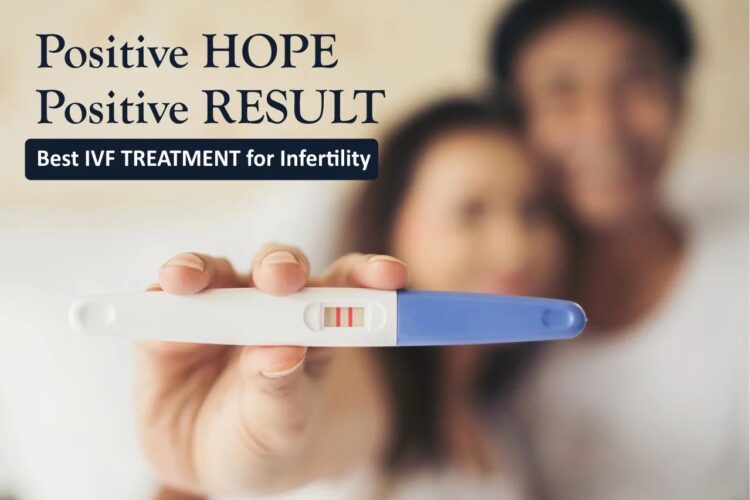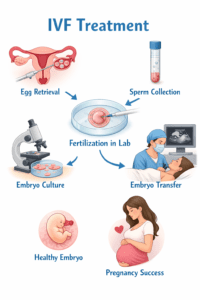
In Vitro Fertilisation
Best IVF Doctor in Delhi NCR – IVF Treatment by Dr Rupali Bassi
If you’ve been trying to conceive and nothing seems to work, it can feel frustrating, confusing, and emotionally exhausting. Fertility concerns are more common than most couples realise—and the right diagnosis, the right timing, and the right treatment plan can make all the difference.
Dr Rupali Bassi is widely recognised as the best IVF Doctor in Delhi NCR, offering patient-focused, evidence-based fertility care at Indraprastha Apollo Hospital. From early evaluation to advanced assisted reproduction, you receive clear guidance, transparent steps, and compassionate support throughout your journey.
Why Patients Choose Dr Rupali Bassi for IVF in Delhi–NCR
Choosing the Best IVF Doctor in Delhi / NCR is not only about procedures—it’s about getting the right plan, at the right time, with the right support.
With Dr. Rupali Bassi, you get:
- Doctor-led consultation and personalized fertility planning (not one-size-fits-all protocols)
- Advanced treatment options including IVF, ICSI, IUI, donor programs, and fertility preservation
- Complete evaluation for both female infertility and male infertility
- Clear explanations, realistic expectations, and step-by-step guidance
- Continuity of care from infertility treatment to pregnancy support
If you’re searching for an experienced IVF specialist in Delhi NCR, this approach keeps your treatment focused, structured, and medically sound.
IVF Treatment in Delhi NCR (and Noida): When Should You Consider It?
You may be advised to start IVF treatment in Delhi NCR—or explore options closer to you, such as Best IVF treatment in Noida—if you have:
- Blocked fallopian tubes or severe tubal damage
- Endometriosis affecting fertility
- Low ovarian reserve or age-related fertility decline
- Repeated IUI failures
- Unexplained infertility
- Severe male factor infertility (low count/motility/morphology)
- Need for donor egg/donor sperm, or fertility preservation
Many patients who consult the Best IVF Doctor in Delhi NCR do so after months or years of uncertainty. A diagnosis-first approach helps you stop guessing and start moving forward with a clear plan.
IVF Treatment in Delhi NCR: Step-by-Step Process

Here’s how IVF treatment in Delhi NCR typically works under Dr. Rupali Bassi’s care:
1) Consultation + Fertility Workup
A detailed evaluation may include:
- Hormone tests (AMH, FSH, LH, thyroid, prolactin)
- Ultrasound for uterus and ovaries
- Semen analysis for male partner
- Additional tests if required (infection screening, genetic screening, etc.)
This stage is important because the best outcomes come from choosing the right treatment for your diagnosis—not skipping steps.
2) Ovarian Stimulation
Medications help the ovaries produce multiple mature eggs. Monitoring is done through ultrasound and blood tests so the cycle stays safe and well-timed.
3) Egg Retrieval
A short procedure is performed to collect eggs from the ovaries. The process is planned carefully to maximize egg maturity and quality.
4) Fertilization (IVF / ICSI)
Eggs are fertilized in the lab. If sperm parameters are weak, ICSI may be recommended to improve fertilization chances.
5) Embryo Development
Embryos are monitored and the best-quality embryo(s) are selected based on development and lab assessment.
6) Embryo Transfer
A carefully timed transfer places the embryo into the uterus. Your plan may include guidance on medications and follow-up to support implantation.
7) Pregnancy Test + Follow-Up
You’ll be guided through the next steps based on results, including early pregnancy monitoring when needed.
This structured process is why many patients consider Dr. Rupali Bassi among the Best IVF doctors in Delhi NCR.
IVF vs ICSI vs IUI – Which Fertility Treatment Is Right for You?
If you’re comparing options and searching for the Best IVF Doctor in Delhi NCR, the key is choosing what fits your diagnosis—not what’s trending.
IUI (Intrauterine Insemination)
IUI may be recommended for mild male factor infertility, ovulation issues, or unexplained infertility when tubes are open. It can be a suitable first step for selected cases.
IVF (In Vitro Fertilization)
IVF is recommended when IUI is unlikely to work or when fertility factors are more complex. Many patients looking for the Best IVF Consultant in Delhi want IVF explained clearly—so they can make confident decisions.
ICSI (Intracytoplasmic Sperm Injection)
ICSI is an advanced technique where a single sperm is injected into an egg. It is commonly advised for severe male factor infertility or previous fertilization failure.
Complete Infertility Treatment by a Specialist in Delhi
Dr. Rupali Bassi provides complete fertility care for couples and individuals. If you’re looking for an Infertility Treatment Specialist in Delhi, you can expect a plan that may include:
- Ovulation tracking and induction
- Timed intercourse guidance
- IUI cycles where appropriate
- IVF/ICSI for advanced infertility cases
- Lifestyle and hormonal optimization
This is comprehensive infertility treatment in Delhi NCR with a diagnosis-first approach.
Female Infertility and Male Infertility Care
Female Infertility Treatment
Female infertility may involve ovulation disorders, PCOS, endometriosis, uterine factors, or age-related decline. Treatment is planned after careful evaluation and ultrasound assessment.
Common concerns addressed include:
- Irregular ovulation and cycle issues
- PCOS-related infertility
- Endometriosis and pelvic pain with fertility impact
- Fibroids or uterine factors affecting implantation
- Age-related fertility decline and low ovarian reserve
Male Infertility Treatment
Male infertility is common and treatable. Semen analysis and further evaluation help decide whether IUI, IVF, or ICSI is the best next step.
Male-factor conditions may include:
- Low sperm count
- Low motility
- Abnormal morphology
- Previous fertilization failure
This combined approach is one reason patients shortlist Dr. Rupali Bassi among the Best IVF doctors in Delhi NCR.
Donor Egg and Donor Sperm Programs
Donor programs can significantly improve chances of pregnancy when medically indicated.
Donor Egg
A donor egg may be recommended for:
- Very low ovarian reserve
- Poor egg quality
- Premature ovarian insufficiency
- Repeated IVF failures due to egg factors
Donor Sperm
Donor sperm may be recommended for:
- Severe male factor infertility
- Genetic concerns
- Specific medical indications
If you’re exploring advanced options with the Best IVF Doctor in Delhi NCR, donor programs are explained with clarity and sensitivity.
Fertility Preservation in Delhi–NCR
Fertility preservation helps protect future options if you:
- Want to delay pregnancy for personal/career reasons
- Have a medical condition that may affect fertility
- Need fertility planning before certain treatments
Options may include egg freezing or embryo freezing, depending on your situation.
PCOS & Hormonal Disorder Treatment
PCOS and hormonal imbalance can affect ovulation and fertility. Dr. Rupali Bassi offers PCOS and hormonal disorder treatment focused on:
- Cycle regulation and ovulation support
- Metabolic and hormonal optimization
- Fertility planning (IUI/IVF when needed)
This supports both fertility goals and long-term reproductive health.
High-Risk Pregnancy Care
Some pregnancies require closer monitoring, especially after fertility treatment or with medical risks. High-risk pregnancy care may be needed in cases of:
- Thyroid disorders, diabetes, hypertension
- Previous pregnancy complications
- Advanced maternal age
- History of miscarriages
Care is planned to support safety, timely monitoring, and reassurance through each stage.
Best Gynaecologist in Sarita Vihar – Women’s Health + Fertility Care
Many women search for the Best gynecologist in Sarita Vihar when dealing with problems like irregular periods, heavy bleeding, painful cramps, PCOS symptoms, recurrent infections, pelvic pain, or fertility-related concerns.
Dr. Rupali Bassi provides complete gynecology evaluation and treatment planning with a strong reproductive health focus—so you don’t have to visit multiple doctors for connected issues.
Women’s Problems Treated (Gynecology Services)
Patients consult for a wide range of women’s health concerns, including:
- Irregular periods and menstrual cycle issues
- Heavy bleeding (menorrhagia)
- Painful periods (dysmenorrhea)
- PCOS and hormonal imbalance
- Fibroids and ovarian cysts
- Endometriosis-related pelvic pain
- Recurrent vaginal infections
- Preconception counseling and reproductive health planning
If you are looking for a trusted gynecologist in Sarita Vihar with experience in fertility-linked gynecology conditions, this integrated approach helps ensure your treatment stays consistent and goal-oriented.
Menstrual Disorder Treatment, Gynecology & Reproductive Health
Menstrual issues can be an early sign of hormonal imbalance, PCOS, thyroid problems, fibroids, or endometriosis. Dr. Rupali Bassi provides:

- Menstrual disorder treatment
- Complete gynaecology consultation
- Reproductive health planning and preconception guidance
Patients who want a single trusted doctor for fertility + women’s health often look for the Best IVF Consultant in Delhi—and benefit from this integrated approach.
Robotic Gynaecological Surgery (More Precision, Better Outcomes)
For selected cases, Dr. Rupali Bassi also provides robotic gynaecological surgery options. Robotic-assisted procedures can offer more precision, smaller incisions, reduced blood loss, faster recovery, and improved surgical outcomes—depending on the diagnosis and clinical suitability.
Gyn Robotic Surgery
Robotic-assisted gynaecology surgery supports precise movements and enhanced visualization, which can be especially helpful in complex pelvic conditions.
Robotic Surgery for Endometriosis
Robotic surgery can help remove endometriosis tissue with high precision, aiming to reduce pain and support fertility goals when appropriate.
Robotic Hysterectomy
A robotic hysterectomy may be recommended for conditions like fibroids, adenomyosis, or abnormal uterine bleeding when conservative treatment is not effective.
Robotic Myomectomy (Fibroid Removal)
Robotic myomectomy focuses on removing fibroids while preserving the uterus, which can be important for women planning pregnancy.
Best IVF Clinics in Delhi – What to Look For
If you’re comparing the Best IVF clinics in Delhi, look for:
- Doctor-led decision making (not generic protocols)
- Transparent testing and treatment steps
- Advanced options like IVF, ICSI, donor programs, fertility preservation
- Clear communication and realistic expectations
This is why many patients choose Dr. Rupali Bassi as a Best IVF Doctor in Delhi NCR for structured, ethical fertility care.
Book an Appointment for IVF Treatment in Delhi NCR
Feeling stuck after months of trying? You’re not alone—and you’re not out of options.
This page is a clear, doctor-led roadmap to fertility care in Delhi–NCR: what infertility tests actually matter, when IUI works, when IVF is the better choice, and when ICSI or donor programs are recommended.
If you’re searching for the Best IVF doctor in Delhi NCR, Best IVF doctor in Delhi / NCR, Best IVF treatment in Noida, or a gynaecologist in Sarita Vihar, consult Dr. Rupali Bassi at Indraprastha Apollo Hospital for evidence-based treatment planning focused on clarity, safety, and the best possible outcome.
Call or WhatsApp at 8700101689
Email: [email protected]


